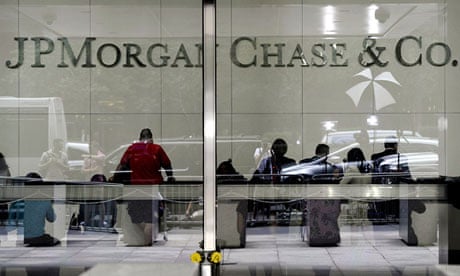Two former London-based traders of JP Morgan have been charged by US prosecutors in relation to the "London Whale" trading incident that cost the US bank more than $6bn (£3.9bn) last year.
Setting out the state's case at a press conference in New York, the city's attorney general, Preet Bharara – referring to JP Morgan boss Jamie Dimon's initial dismissal of the potential losses – said: "This was not a 'tempest in a teapot', but rather a perfect storm of individual misconduct and inadequate internal controls."
Bharara refused to comment on whether other JP Morgan bankers would face charges. "The investigation remains open," he said.
Javier Martin-Artajo and Julien Grout were charged in the southern district court of New York with four counts of falsification of books, wire fraud and making false statements to the US regulator the Securities and Exchange Commission.
Bruno Iksil, the French-born trader dubbed the London Whale for his large trading position, is not being charged, according to documents issued by the US department of justice on Wednesday and sent to Iksil's lawyer on 20 June.
Iksil, also nicknamed "Voldemort" by other traders because of the impact his huge bets were having on the market, is co-operating with the US authorities as they build their case.
His agreement with the justice department does not exempt him from other potential actions but officials said they would "bring the co-operation of Iksil" to the attention of any prosecutor who might pursue him.
Bharara alleged that as the London losses mounted the defendants began to "creatively cook the books". By March 30, 2012, January losses of $130m had risen to $767m. "I don't know where he [Martin-Artajo] wants to stop, but it's idiotic," Iksil told colleagues as JP Morgan's losses began to spiral out of control.
Lawyers for Martin-Artajo did not update a statement issued on Tuesday night in which they said he was "currently on a long-planned vacation and will be returning to the UK as scheduled".
"Martin-Artajo has co-operated with every internal and external inquiry which was required of him in the UK. He received no communication from any governmental regulators, including the Financial Conduct Authority in the UK with whom he has fully co-operated, which would indicate that he should not be on vacation at this time," said his lawyers at Norton Rose Fulbright.
"Martin-Artajo is confident that when a complete and fair reconstruction of these complex events is completed, he will be cleared of any wrongdoing."
Grout's lawyers are also reported to have said he has not committed any wrongdoing.
The prosecutors said JP Morgan had issued its results for the quarter ended 31 March 2012 on the basis of false and fraudulent information about the value of complex credit derivatives conducted by the bank's chief investment office (CIO).
Those results were later restated by $660m as a result of mis-valued trading positions, the prosecution alleges.
The prosecutors said the CIO operation employed 100 people and that Martin-Artajo was head of credit and equity trading, working out of London but visiting New York. Iksil worked for him, as did Grout.
In the allegations about Grout, the prosecutors said there was a "growing disparity" between valuations in their trading books and what the traders believed were the actual values.
"This gap reached hundreds of millions of dollars by the end of March 2012," according to the allegations which cite email exchanges between employees.
The prosecutors said JP Morgan later discovered that 107 of 132 trading positions were marked in the books at more favourable prices than they should have been.
The losses have proved embarrassing for Dimon. Once the extent of the losses emerged the chief executive apologised. His bonus was cut in half as a result and the bank conducted internal reviews. Its top bankers have also appeared before the US Senate.
Dimon later admitted that "some of these mistakes obviously scared us".
